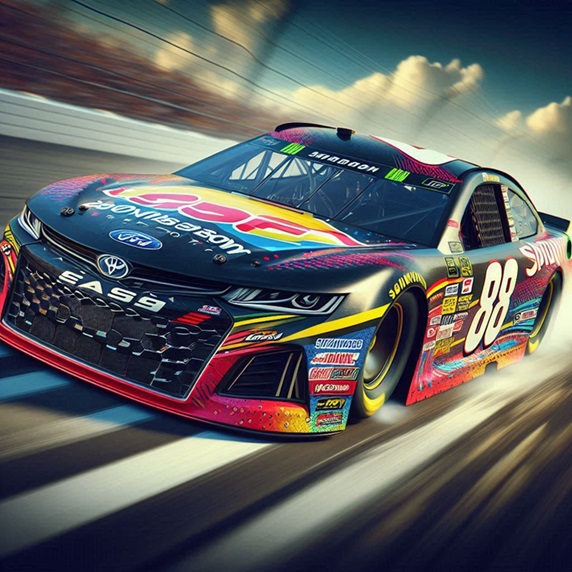
NASCAR (National Association for Stock Car Auto Racing) is not just a sport; it is a cultural phenomenon that has captured the hearts of millions of fans across the United States and around the world. With its high-speed action, intense rivalries, and deep-rooted traditions, NASCAR has evolved into one of the most popular motorsport organizations globally. This article explores the history, significance, and future of NASCAR, illustrating why it continues to be a cornerstone of American sports culture.
A Rich History
NASCAR was founded in 1948 by Bill France Sr. in Daytona Beach, Florida. Initially, the organization sought to bring order to the chaotic world of stock car racing, which had become increasingly popular in the post-World War II era. France’s vision of a structured racing series led to the establishment of the NASCAR sanctioning body, and NASCAR’s first-ever stock car race took place on June 19, 1949. The series has evolved significantly over the decades, growing in popularity and professionalism.
The history of NASCAR is replete with legendary figures, from early pioneers like Jim Roper, Wendell Scott, and Hershel McGriff to contemporary stars like Jimmie Johnson, Kyle Busch, and Chase Elliott. These drivers are not merely competitors; they are icons, embodying the spirit of determination and talent that characterizes NASCAR.
The Race Format
At the heart of NASCAR’s allure is its unique race format. The premier series, known as the NASCAR Cup Series, consists of 36 races held at various tracks across the United States, including iconic venues like the Indianapolis Motor Speedway, Talladega Superspeedway, and the Bristol Motor Speedway. These races vary in length, with the Daytona 500, often described as the “Great American Race,” being the season opener and one of the most prestigious events in motorsports.
Races are characterized by multiple segments, with drivers accumulating points based on their finishing positions. This points-based system is complemented by a playoff format, known as the NASCAR Playoffs, which culminates in the championship race. The combination of endurance, strategy, and raw speed creates a captivating spectacle for fans, while also demanding exceptional skill and mental fortitude from the drivers.
The Fans And The Culture
NASCAR is renowned for its passionate fanbase, which is one of its most defining features. The sport attracts a diverse audience, from long-time enthusiasts to families looking for a thrilling day out. Race weekends are more than just races; they are community events filled with tailgating, fan interactions, and pre-race festivities. Fans often form lifelong loyalties to drivers and teams, creating an atmosphere of camaraderie and shared passion.
The culture of NASCAR is deeply intertwined with American identity. It embodies values like hard work, perseverance, and community, resonating with fans across social strata. The accessibility of many events allows fans to connect with their heroes in a way that other sports cannot match, as drivers often engage with the crowd through autograph sessions and meet-and-greet opportunities.
Technological Innovation
NASCAR has continuously adapted to the evolving technological landscape in motorsports. From advanced safety measures to cutting-edge vehicle technology, the organization prioritizes both performance and driver safety. The introduction of the Next Gen car in 2022 represents a significant leap forward in terms of aerodynamic efficiency, safety features, and cost-effectiveness, aligning with NASCAR’s commitment to sustainability and fairness.
The incorporation of analytics and data-driven strategies has also changed the game, with teams investing heavily in research and development to gain a competitive edge. Fans, too, have benefited from technological advancements, with improved broadcasting options, apps, and virtual reality experiences enhancing their engagement with the sport.
Looking Ahead
As NASCAR continues to grow in the 21st century, it faces unique challenges and opportunities. The desire to attract a younger and more diverse audience has prompted NASCAR to implement initiatives aimed at inclusivity and outreach. This includes fostering relationships with new fans, promoting grassroots racing, and diversifying the sport’s representation.
Furthermore, NASCAR is increasingly embracing environmental sustainability, exploring ways to reduce its carbon footprint and incorporate alternative fuels. This forward-thinking approach will be pivotal in ensuring the sport remains relevant in a rapidly changing world.
Conclusion
NASCAR is more than just fast cars and thrilling races; it is a testament to the enduring love of motorsports in American culture. With its rich history, passionate fans, and commitment to innovation, NASCAR continues to be a driving force in the world of sports. As the organization evolves, it will undoubtedly face challenges, but the dedication to its core values ensures that the thrill of racing will remain at its heart, captivating audiences for generations to come. Whether you’re a die-hard fan or a curious newcomer, there’s no denying that NASCAR delivers an exhilarating experience that is uniquely American.
